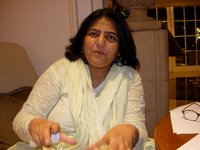 First published in The Jakarta Post, September 18, 2006
First published in The Jakarta Post, September 18, 2006KHALIDA SALIMI: WOMEN'S ACTIVIST IN PAKISTAN
Alpha Amirrachman, Contributor, Jakarta
In the 1970s Khalida Salimi was at Lahore College for Women studying Sociology and Journalism.
She was actively involved in challenging General Zia-ul-Haq's military government, which strictly imposed Hudood Ordinances, a set of Islamic penal laws misused to discriminate against women.
Nevertheless, Pakistan's fragmented and unpredictable political circumstances are always complex.
Now, as a women's activist she is still struggling to repeal the laws, but in a very different situation: vehement opposition from the elected members of the parliament. There are 342 seats in the National Assembly of Pakistan; 72 women are currently members, and Pakistani law requires that at least 20% of the members be women.
"However, the irony is that any attempt by the current government of President Pervez Musharraf to reform the law has always failed due to strong resistance from the Muttahida Majlis-e-Amal (MMA)," Khalida said, referring to an alliance of six anti-Western Islamic groups, which stunned many by its success in the 2002 elections.
Though not a majority, these influential religious groups delivered a notable electoral success after the Musharraf-led military government permitted an election.
"Unlike Zia, Musharraf is known to be progressive when it comes to women's rights issues; he lent his political support to efforts to repeal or drastically amend legislation," she said.
In Pakistan, where 97 percent of the population is Muslim and where patriarchal culture is still strong, the problems of Muslim women are worsened by the existence of Hudood Ordinances, which classify levels of crime and carry severe punishment. The ordinance includes an adultery law that can mean female victims of rape may end up in jail.
After the lapse of a quarter century, the legislation did not contribute to the "Islamization" of society, she said. On the other hand, mishandling of the laws has resulted in victimization of weaker elements of society, especially women.
"Women are regarded as a possession of man, and women's awareness of their rights is still very low," said Khalida during a study tour of activists from South Asian countries organized by the International Center for Islam and Pluralism (ICIP) in collaboration with The Asia Foundation in Jakarta.
Khalida conceptualized, designed and implemented a project themed Women in Crisis in 1989. She later established a non-governmental organization (NGO) named Sach (truth) in 1993, which has now received special consultative status by the United Nations Educational, Scientific and Cultural Organization and has also been accredited by the UN's Department of Public Information.
Sach has been dealing with human rights abuses, with particular focus on the well-being of survivors of torture. The NGO has been working for the nondiscriminatory rehabilitation and reintegration of survivors of organized violence and torture.
Sach is committed to working towards a torture- and violence-free society. It achieves this by sensitizing people and providing a variety of services to torture survivors.
This includes medical help to deal with all kinds of medical problems, as well as psychotherapy assistance aimed at helping the survivors deal effectively with their painful experience.
Physiotherapy is used to treat injuries sustained as a result of physical and psychological torture; stress tension reduction and life skills workshops incorporate exercises and massage for stress tension reduction therapy.
Socioeconomic support is given in the form of legal assistance, temporary shelter facilities, small business training and counseling. Sach also gives vocational training to women, though it applies certain "strategies" to do this.
"We always emphasize that the skills would only enable women to be productive at home," Khalida explained of the difficulty in gaining acceptance of wider society where patriarchal culture is still entrenched with regard to the increased role of women in the public sphere.
Recalling the agony that women had to suffer in her country, Khalida said that during her long experience as a women's activist she was once called by a doctor from a hospital to counsel someone who had been brutally tortured by her husband.
"The woman ran a successful milk business and her husband seemed to resent this. He delivered bottles of milk to his friends who never paid, which angered the wife. But the husband tied her up and chopped off her nose.
"He brutally deformed her. The very first thing she asked me was `Am I going to get my nose or my hair back?'" said Khalida, imitating the trembling woman. She also added that an Australian volunteer who accompanied her fainted immediately upon seeing such brutality.
"But we enabled her to put her life back together. We supported her to undergo plastic surgery. The couple got divorced, but her husband was freed from jail due to pressure from the village where they came from."
"Even Khadijah, the wife of prophet Muhammad, is a successful entrepreneur, so why don't you let us explore our potential and be productive to contribute to the economic life of the nation?" Khalida challenged.
Born on May 7, 1956 in Lahore, Khalida is married to Javaid Mehmood, an English professor. They have three children. She said that she always receives support from her husband for her social activism.
If she was extremely busy, she often let her husband go alone to weddings or family gatherings -- bizarre in a society where a wife is regarded as a servant of her husband and must be ready to accompany and serve him on important occasions.
"He might have had to put up with wagging tongues, but he never says so," Khalida said.